-
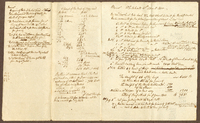 Memorandum for Whitehall, including the hire, clothing, and feeding of enslaved people, April 15, 1800
Memorandum for Whitehall, including the hire, clothing, and feeding of enslaved people, April 15, 1800 Memo primarily regarding the enslaved people of Whitehall, beginning with the bushels of wheat taken to the mill. Wheat is listed as given to Sharper, Jem, Young Jem, "Black People", and others.
In the list of items to-do is a line regarding the hire of Molly: "Enquire of Porter if he had fixed John Raymond the hire of Molly for the last of and year before." The last item on this list reads "Qu(?) of Mr Raymond if he can get nothing (?) from Negro Jacob"
This list also references Creppen hiring 2 boys, and states that he sent down 12 yards of linen for men's cloathing. The line for March 7th seems to be referring to feeding the enslaved people, reading "began upon Big Meat for People- at the rate of 11 & 12 ___?, 90 Hams 8 Shoulders & 8 Jowls."
-
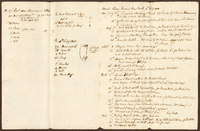 Memos from Joseph Porter's Day Book, February 04, 1800
Memos from Joseph Porter's Day Book, February 04, 1800 Varied memos and tasks from July-December 1800. There are numerous entries regarding select enslaved people, including:
Aug 7th- Dick to Mill with 25 Bush Corn for People & 1 1/2 for Porters use
Sept 10- Dick to Mill with 28 bush Corn for People 1 ½ for Porter’s use and 2 bshls wheat
Sept 22nd- Hetty went to E. Carney's
Oct 9- Prince & Merrit sett in to Ditch & Bank also began to tread wheat & cont 10th & 11th trod __ 25 bsh
Oct 13- Dick to Mill with 24 bsh corn for People & 1 ½ Porter's use
Oct 22- Peg come home from Vanwinkle’s at X Roads – Mr V being dead
Nov 19- Dick to Mill w 20 bshl corn & 1 for Porter's use
Dec 18- Enos to Mill w s7 bshl corn & 1 ½ for Porter
Dec 28- Wheat to Merrit, to the People at Whitehall, 3 to Abby, amongst other
The last page includes the note "My Father rec'd from me 80 Doll enclosed by Porter from Edwd Carney being the Price of Hetty sold him-
Memo my Father sent down Bill of Sale by Andrew Naudain"
The other side continues with additional memos for the plantation, not specified to Porter's daybook.
-
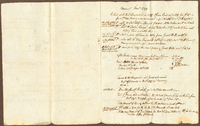 Memorandum for Whitehall on crops, stock, and hiring out of enslaved workers, November 1799
Memorandum for Whitehall on crops, stock, and hiring out of enslaved workers, November 1799 Various notes regarding the enslaved workers, including the following:
Had a pair of Shoes for Abby from Jacob Hill not pd for
Speak to Mr Raymond abt Jacob who owes 2 years of £3 each in Dec 1797 qu how many since
At Whall:
Bea the Son of Rachel qu what is to be done with him
Qu? If W. Denny did not retain the Black woman hired with from Dec 1795 to 1796 if so he owes 1 yrs hire £5
And the last line of the document:
He owes havg hired Cato & Aaron to Crippen @15 for the work they did
-
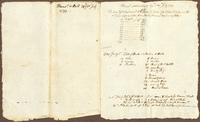 Memo at Whitehall, July 29 & 30, 1799
Memo at Whitehall, July 29 & 30, 1799 The first section breaks down the hands and stock at Whitehall, under January 1st:
10 Men
6 women
11 Children
6 horses
6 mules
95 head of Out cattle
21 yearlings
1 early Calf
1 Boar
8 Breeding Sows
59 small Hogs
24 young pigs
46 Head Sheep
The rest of the memorandum focuses on clothing and fabric, including measurements of the enslaved people and number of shirts, shifts, blankets, and various petticoats and jackets.
-
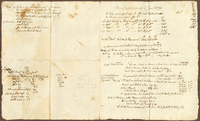 Memo taken at Whitehall including list of the enslaved, January 01, 1799
Memo taken at Whitehall including list of the enslaved, January 01, 1799 Memo at Whitehall of varied lists, including work done by Merrit, Cato, Abby and Aaron such as plowing and ditching. There is also what looks to be a complete list of the enslaved people at or belonging to the plantation:
Lemon
James
Sharper
Cato
Dick
Enos
Aaron
James Jr
Abby
Yarm
Boy Ben Rachels Child taken home Sept 99
Silvia
Sarah
Lucey [Lucy]
Nan
Sal
Sukey
Luceys child[ren]:
Phin
Hannah
Rachel
Lucey [Lucy]
Tish
Jenny 4 mo old
Nan’s child[ren]:
Grace
Jacob
Lydie
Betsy born in Feby 99
Sal’s [children]:
Phillis 3 yr old
Tish 2 yr old next fall
On the page prior is a line indicating Negro Sam Calhoun "took home his wife Tish & 3 Child..."
-
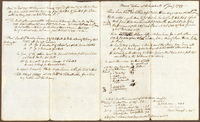 Memo taken at Whitehall, January 01, 1799
Memo taken at Whitehall, January 01, 1799 Primarily pertains to livestock and harvest, save one section pertaining to the hiring out of an unidentified enslaved woman:
The Ball of Principal settled to be due on W Dennys Bond on the 24 Dec 1795 - p act with my ha__ was £500.12.0 Qu what Int(?) has he pd since NB Acct settled with him for the hire of Negro woman - Dec 1795 Qu if he did not retain the woman from Dec 1795 to 1796 @ £5
-
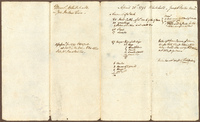 Memo of Whitehall under Joseph Porter, April 1798
Memo of Whitehall under Joseph Porter, April 1798 The top of the backside of the memorandum lists births amongst the enslaved people between 1787-1792, including Hetty of Young Rachel, Dot of Tish, Hannah of Lucey [Lucy], and Ruth of (Elder?) Rachel.
Continues to discuss clothing for the enslaved, including Linnen for Trousers & Petitcoats- "in June 98 Porter writes all the men except Lemon had shirts of it..."
The last lines include the following directions: Write to R Denny for arrears[.]
Mr Raymond ab Jacob who owes two years of £3 each in Dec 1797
2nd (?) of Priscilla - NB her Child Lucy(?) is near 16
NB Ben son of eldest Rachel born ___? 8 year old
-
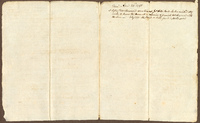 Assessments of Whitehall property, including enslaved people, 1797-1798
Assessments of Whitehall property, including enslaved people, 1797-1798 Two short lists of Benjamin Chew's property at Whitehall for 1797 and 1798. Both assess Land, Slaves, and Personal Property.
Year 1797 states ownership of 38 enslaved people, and 1798 lists 42.
-
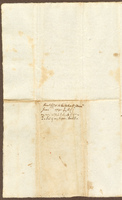 Whitehall Memo- List of enslaved people with notes on age and location, June 1790
Whitehall Memo- List of enslaved people with notes on age and location, June 1790 List written by Benajmin Chew, Jr., with an additional list by his father from October 17, 1790. The list is separated by Men, Boys, and Women, as well as side notes on other individuals, most with ages:
Men:
old Lemmon
say 40 Sharper
says he is 52 Jem
29 or 30 Abbey
Not more than 30 Cato
22 Enos
23 Dick
Boys:
11 Aaron Rachel’s son
9 Yarm Lucey’s son
Retd from (____?) in Apr 1790 - 11 Bill mother dead
7 Davy Lucey’s son
Side Notes:
Cooper hired to Dav Bellah £11.5
Davy 29 ys old [ditto[ £15
Sal Cooper’s daughter [ditto]
Latitita to Cha Calhoon for Prov & Cloaths & sent to him Mar 10th 1789
Jem – Lucey’s Son abt 11 y old [ditto]
Lucey retd (returned?) by Wm Calhoon now with Dick Butcher’s mother a Free Negro - Prist(?) Mother in Law
Peg to Wm Denny & 1 yr due Nov 11 89 £7
Sarah wh Wm Calhoon
Rachell & Child to Whitehart at £3 pr an
Women:
Old Silvia h
Old Sarah 0
Good Rachel h
Good Lucey [Lucy] h
Lame Priscilla 0
Always (??) Nan h
19 Judith Sal’s o
Jenny – ho Rachels
Abt 14 born 31st Dec/89 Ben – ho Rachels
5 to tend (?) children Sukey- Nan’s h
5 Peg - Lucey [Lucy]
3 Mary - Lucey’s
1 yr old Jan[uar]y 1790 Phin - Lucey’s child
Between 2 & 3 yr Beck - Nan's
3 Ruth - Rachels
Ab2 Beck Priscill [sp]
2 Nancy - Rachels
Born in Mar/90 Bet - Nan's
Later note by Benjamin Chew:
Letitia returned from Cohoon
Jem returned
Rachel returned from Whitehart and her child NB both to be sent back the child at least(?) & y Mo to be kind(?) out
-
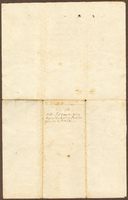 Whitehall Memorandum- List of some of my Negro's thus hired & put out as given me by M. Weeks, May 1788
Whitehall Memorandum- List of some of my Negro's thus hired & put out as given me by M. Weeks, May 1788 List written by Benjamin Chew:
Priscilla & her 2 Children with Jn Freeman Dover for their Victuals & Cloaths
Rachel & a young child hired Sept 8th 1787 to Allen Whitehart for £3 a year
Old Sarah hired in Sept 16 1787 to Thos Jones for £4.0.0 a year
Jude hired in Sept 17 1787 to Jno Conner for £5.0.0 a year
Sall a Girl abt 11 ys old put to Jno Snodwn (sp?) for Victuals & Cloaths
-
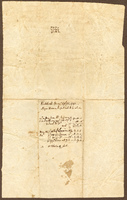 Negro's put out last Winter by George Ford, April 25, 1791
Negro's put out last Winter by George Ford, April 25, 1791 This list written by Benjamin Chew includes:
Tish or Letitia agd 17 or 18 put to Allen Whitehart in Nov w Child Victuals & Clothes
Judith put to Black Abraham her Father living joining Sterlings at £5 a year
Rachel & Child names little Rachel to same Abraham at £3.0.0
The remainder of the list is composed of horses and cattle sold by George Ford in October.
-
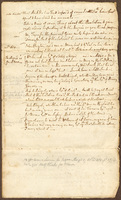 "Memo made at Whitehall" with list of enslaved people & measurements, ages of children, and those hired out in December 1793
"Memo made at Whitehall" with list of enslaved people & measurements, ages of children, and those hired out in December 1793 This memorandum primarily focuses on the enslaved people of Whitehall. It begins with a "List of Negroes" documenting the status of new shoes and shifts, and in some cases stockings. First listed are the men; Lemon, James, Sharper, Abby, Cato, Enos, Dick, Bill, Aaron, Jem Jr., followed by the women with the note " Linnen for shifts ready" at the end of their names: Silvia, Sarah, Lucy, Nan, Jenny, Tish. Jenny is noted to be 16 years old, and Tish being 18.
Lucey children and their ages follow, including Peg, Molly, Phin, Hannah, and twins Lucey and Rachel. Then Nan's children Suk [Sukey], Grace, and Beck, then Tish's children Dol and Bet, and finally Jenny's son Stephen.
The next section lists those who were hired out and where or to whom:
-Davy hired to Bellah
-Rachel with 3 Children lived wh Collin's Jack for Victuals & Cloaths
Sarah's Child:
-Rachel Jr. with 1 child lives with her Father Collins' Abram [Abraham?]
-Jude - same as Rachel noted to be "now again big with child"
[Both children include the note "refuse to be hired"]
Lucy's Child:
Yarm (12 yr) lives with Rob[ert] Denney near Martin's Bridge for Victuals & c[lothes]
Davy [lives] with W. Cumberfoot
16 - Sal with Thos Jones at £3 - NB S[ai]d to be big w Child
Priscilla with 1 child at Dover
Lucey [Lucy] her child lives w Stephen Allston
Sarah lives with W[illia]m Calhoun
40 Peg lives with Wm Denny
The following page includes information on the enslaved people's clothing, such as stating that a "large man's shirt" requires 3 1/2 yards of linen, and a woman's shift requires 2 1/2 yards.
-
 Memos regarding the enslaved people of Whitehall by Benjamin Chew, 1791
Memos regarding the enslaved people of Whitehall by Benjamin Chew, 1791 The first page of this document is composed of a list varied tasks over 1791 to be done at Whitehall from Benjamin Chew to his son in the management of Whitehall. The first page includes the inquiry "Has Ford got my Negro's winter cloathes, the mens full'd & the Women's wove only I sent him lately 150 yds Linnen w[hi]ch is more than will give them all great & small 2 shirts and shifts a piece. What is left he should preserve. I sent him also 17 p[airs] pf shoes & one of my Fin[e?] bags wch you must bring back to me."
The other side of this page is written in Benjamin Chew Jr.'s hand, titled "Memo taken from a lone Paper of my Father dated April 25th 1791. The first line states that enslaved women Tish or Latitia are to be hired out to Allen Whitehart, noting that Whitehart owes them for the hire of Rachel from 1788-1790, owing "a Ball of about 14 Dols [dollars?]". Judith is to be sent to Black Abraham, her father, " living adjoining Sterling's" at £5 pan (?). The next line reads "Rachel and her child called Little Rachel to Same Person [__?] £3.
The next section reads "Tish or Latitia is taken from A. Whitehart where Both her children died and she is with Wm. Wharton near the Methodist Meetinghouse"
The following line reads, "Sal- Daughter of Cooper is ret'd from Bellah's he having no further occasion for her Whitehall- Gave her Liberty to get herself a good Place to be approved of by Ford within a Week."
The remainder of the page is a list of enslaved people's names starting with the men and women:
Sharper, Jem, Abby, Cato, Enos, Dick, Lemon, Aaron, Jem - Lucy's son, Yarm, Bil, Davy (- 9 yr old, Lucy's son), Ben, Silvia, Sarah. Rachel, Lucy, Priscilla, Nan - ready to lay in, Sal - from Bellah, Jenny.
Followed by the children:
Sukey, Peg, Mary, Phin, Beck - Nan's child, Ruth, Beck - Pris'a [Priscilla] Child, Nan - Rachel's, Bet - Nan's, Hannah- Lucy's 7 mo old, Davy - wh [with?] Bellah, Tish wh Wharton, Judith & Rachel - with Abraham.
-
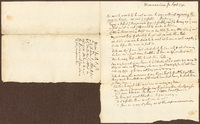 Memorandum for Benjamin Chew, Jr. regarding Whitehall, 1792
Memorandum for Benjamin Chew, Jr. regarding Whitehall, 1792 List of varied tasks to be done at Whitehall from Benjamin Chew to his son, ranging from paying taxes, managing Overseer Ford, and caring for the enslaved people. The list directs Chew, Jr. to "Take and carry the measures of my Negro's feet to chest [___?] to get their shoes made there. Write me if it can't be done that I may beseach them in Time here." He is also asking for a report on the preparation for "my Negro's woolen cloathing for both Men & Women. The Linnen I suppose I must provide." Chew also asks about the potential need for blankets and if they have meat.
-
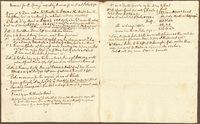 Memo for Benjamin Chew, Jr. respecting Business in Kent, July 1794
Memo for Benjamin Chew, Jr. respecting Business in Kent, July 1794 Memo from Benjamin Chew to his son with a list of items to-do. In addition to business related tasks such as writing letters, the list includes "Tak[ing] measure for the negro's shoes at Whall". There is a note that looks to be in Chew, Jr's hand regarding the sale of an unidentified enslaved person, reading "A judg[men]t was obtained agt [?] Jas Smith for £50 or £60 the amt of a negro sold by ET [Edward Tilghman?]- this man has nothing to pay[,] his real Property being more than covered by a mortgage to Mrs. Banning."
There is also a sketch in pencil of what looks like land, but there are no notes.
-
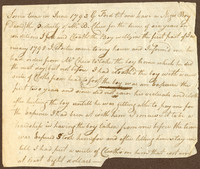 Note to Benjamin Chew regarding hiring of enslaved boy, David, June 1793
Note to Benjamin Chew regarding hiring of enslaved boy, David, June 1793 Note from T. Camerford to Benjamin Chew, by means of James Raymond. Camerford has hired enslaved boy David from Whitehall and is writing Chew after David was taken from him after 2 years of work, though he was hired out for six. Camerford is complaining that he has spent the money to fully clothe David and has essentially not gotten his money's worth in labor to cover the cost of the clothing and victuals provided for David.
-
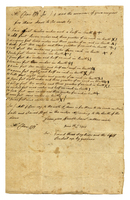 Measures for Negro's shoes, June 11, 1788
Measures for Negro's shoes, June 11, 1788 Matthew Weeks to Benjamin Chew, listing the measurements for shoes for the enslaved persons at Whitehall. Weeks writes "I send the measuers of your neaguers for their shoes to be made by...". He lists the measurements of seventeen individuals, including Ben, Abb [Abby], Sharper, Dick, Cato, Jack, Jim, Lemon, Enus [Enos], Aaron, Bill, Jim [Jem], Silvy [Sylvia], Rachel, "Luse" [Lucy], Nan, and "Jain" [Jane?]. He ends the letter addressing the shoes' widths: "All I Can say to the weth [width] of the shews is for them to Made on Braid Lasts ad Raised High in the instep Acording to the lenth of the shews."
-
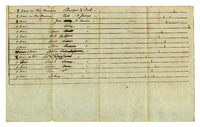 Measure for Shoes for Whitehall, n.d.
Measure for Shoes for Whitehall, n.d. Long piece of paper with enslaved persons' names and a line measuring their foot. Includes, Sharper & Dick, Cato & James, Jim & Aaron, Abby, Lemon, Bill (dead), Enos, Sylvia, Latitia, Sal, Sarah, Lucy, Nan, and Sukey. Sukey's line shows growth between original measurement and 1798, written with a pencil, possibly the same for Aaron, but no year specified.
-
 Measure of People at Whitehall for Shoes, September 1797
Measure of People at Whitehall for Shoes, September 1797 Long piece of paper with enslaved persons' names and a line measuring their foot. Presumably by George Ford, reading "the people meashers for their shoes at whit hall". Multiple lines are shared, assuming they have the same size feet. Includes "Sharper and dik [Dick] on one measher", "Cato and James on one measher", "Abs" [Abby?], Jim and aron [Aaron] on one", Lemon, "bil" [Bill], Enos, "Silves" [Sylvia?], Tish, "Sal and Jin [Jem?] on one", "Sary" [Sarah?], "Lusa" [?], Nans [Nan], and Suks [Sukey]
-
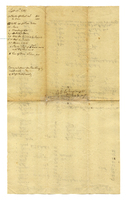 List of my Negroes in Kent taken August 1787 [by Benjamin Chew]
List of my Negroes in Kent taken August 1787 [by Benjamin Chew] List of Benjamin Chew's enslaved people, including their ages as well as some mothers and notes of where they've been hired out to. It is broken up in four sections: [untitled, but assumedly "Men", all of whom are likely at Whitehall] Lemon, Copper [Cooper?], James, Ben, Sharper, Cato, Abby, Enos, Dick, Jacob, Davy. Boys: Little James, Aaron, Bill, Yarm, David. Women: Sylvia, Salk[?], Rachel, Lucy, Priscilla, Rachel, Han, Sarah, Peg, Latitia. Girls: Jane, Sal, Sukey, Peg, Little Lucy, Berk, Ruth, Het, Judith.
-
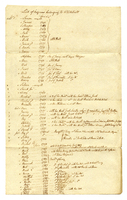 List of Negroes belonging to Whitehall, n.d.
List of Negroes belonging to Whitehall, n.d. Extensive list of the enslaved people belonging to Whitehall, some at the plantation and some hired out. It is detailed in birthdates, mothers & children, and individuals or places they have been hired out to. The list of enslaved people at Whitehall reads: Lemon (very old), James, Sharper, Abby. Cato, Enos, Dick, James Jr, Aaron, and Yarm. The following individuals have been mostly hired out: Stephen, Ben, Bob, Jacob, Bill, Charles, Harry, Sylvia (very old), Sarah [Jr?], Lucy, Rachel, Rachel Jr, Priscilla, Nan (dead), Jenny, Sarah Jr, Peg, Latitia, Judith, Sarad 3d, Peg Jr (sold), Sukey, Rachel 3d and Lucy (twins- Lucy sold to Andrew Naudain January 1803), Beck, Dol, Molly, Phin, Hannah, Het, Beck 2d, Grace, Abithah, Ruth, Phillis, Hafa (?), Lish, Latitia, Sylvia, Lydia, and June.
-
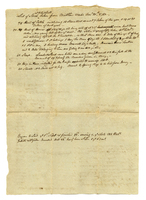 Whitehall memo of Stock & Negro's given by M. Weeks to B. Chew, November 20, 1788
Whitehall memo of Stock & Negro's given by M. Weeks to B. Chew, November 20, 1788 Incudes multiple lists regarding the enslaved people of Whitehall. The first is a "List of Negroes at Whitehall, Nov. 19, 1788":
Lemon
James
Ben Died in Aug 1789
Sharper
Cato
Abby
Enos
Dick
Jacob Died in Jan 1790
Little Jem abt 11 or 12 let to Cha Cohoontay (Calhoun o?)
Aaron – 9
Bill – 9
Yarm – 7
David – 5
Sylvia – old
Sarah – old
Rachel
Lucy
Nan
Judith – Memo to be hired out again
Jane - say 12
Young
Sukey
Peg – Lucy’s
Beck daughter of Nan
Ruth
A child of eldest Rachel born last March
July 87 Child of Lucy
Following note from May 1789 states that Judith was hired out March 10, 1789 to Com. Howard. The next list titles "Negroes belongin to W Hall but hired out" includes Davy to James Bellah (sp?), Cooper with Mr. Bassets, Priscilla and 2 children with Freeman (person who hired them is not listed, Rachel and Child to W. Whitehart, Sarah to W. Cohoon by Ford. Peg "very good" to W. Denney, Latitia to Jas. Numbers, and Sal "say 11 yr old to Louder (sp?). Another list from May 1789 in Benjamin Chew's hand includes Letitia, Lucy ("one of Priscilla's children"), Priscilla (returned to Whitehall), and Bill.
-
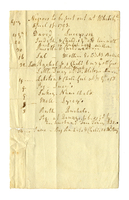 Negroes to be put out at Whiteh[all], April 16, 1793
Negroes to be put out at Whiteh[all], April 16, 1793 Note in Benjamin Chew's hand, including ages and mothers. The list reads:
"10 yr David Lucey’s son [Lucy]
Judith & child 1 yr old him with ---?_ in (?) will sell them
Priscilla & child at Dover
Sal – Mother dead NB Bellah
Little Rachel & Child 6 or 7 yr a Girl
Little Lucy at H Alstons Dover
Letitia & Child Girl at 6(?) yrs old
Peg – Luceys
Sukey Nan’s child
8 (9?) Moll Lucey's
8 Ruth Rachels
Peg at Dennys to be sold to her husband Free Toney £35
16 Jane – Big Rachels & Child 10 Mo Boy"
-
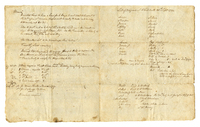 List of Negroes at Whitehall, September 28, 1792
List of Negroes at Whitehall, September 28, 1792 List includes those at Whitehall and some that have been hired out, and to whom. The enslaved workers are:
Lemon
Sharper
James
Abbey
Cato
Enos
Dick
Aaron
James Jr
Bill
Yarm
David
Ben – near 2 Rachels
Jane’s son Stephen – say 3 mo born last of June
Sylvia
Sarah
Rachel
Lucy
Nan
Tish or Latitia
Jean
Peg – say 8 yr old
Sukey d[itt]o
Molly -7
Beck – 6 (Nan’s)
Grace – born in April (Nan’s)
Ruth – Rachel’s -7-
Nan – 5 – died in Dec 1792
Phin - Lucey’s 4 yr
Hannah 2
Dol – Tish’s born in July
Added to the above Lucy had a child in beg July now dead
David – hired to Bellah
Sarah – hired to W Calhoun
Priscilla & Child in Dover
Sal – to Blackshare the 30th July last for 1 yr @ 55/p ab
Little Rachel – to Black Abraham
Judith – D[itt]o
Little Lucy– Stephen Alston in Dover
Peg – w Wm Denny
-
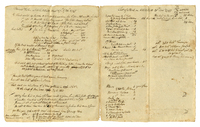 Negroes at Whitehall, April 26, 1792
Negroes at Whitehall, April 26, 1792 This extensive document includes the names of the enslaved people, as well as some cloth measurements. There is also a list of people who need shoes, including Abby, Sharper, James Jr., Enos, Dick, Aaron, and James. The formal list of workers reads: Lemon
James
Sharper
Abby
Cato
Enos
Dick
James Jr
Aaron
David taken to Philade[lphia]
Sylvia
Sarah
Lucy
Nan
Sarah
Latitia
Sukey
Children
Rachel
Lucy
Dol
Phin
Hannah
Grace
Phillis
Jacob
Bill
Latitia Jr
Sylvia – 3 weeks old
 Memorandum for Whitehall, including the hire, clothing, and feeding of enslaved people, April 15, 1800 Memo primarily regarding the enslaved people of Whitehall, beginning with the bushels of wheat taken to the mill. Wheat is listed as given to Sharper, Jem, Young Jem, "Black People", and others. In the list of items to-do is a line regarding the hire of Molly: "Enquire of Porter if he had fixed John Raymond the hire of Molly for the last of and year before." The last item on this list reads "Qu(?) of Mr Raymond if he can get nothing (?) from Negro Jacob" This list also references Creppen hiring 2 boys, and states that he sent down 12 yards of linen for men's cloathing. The line for March 7th seems to be referring to feeding the enslaved people, reading "began upon Big Meat for People- at the rate of 11 & 12 ___?, 90 Hams 8 Shoulders & 8 Jowls."
Memorandum for Whitehall, including the hire, clothing, and feeding of enslaved people, April 15, 1800 Memo primarily regarding the enslaved people of Whitehall, beginning with the bushels of wheat taken to the mill. Wheat is listed as given to Sharper, Jem, Young Jem, "Black People", and others. In the list of items to-do is a line regarding the hire of Molly: "Enquire of Porter if he had fixed John Raymond the hire of Molly for the last of and year before." The last item on this list reads "Qu(?) of Mr Raymond if he can get nothing (?) from Negro Jacob" This list also references Creppen hiring 2 boys, and states that he sent down 12 yards of linen for men's cloathing. The line for March 7th seems to be referring to feeding the enslaved people, reading "began upon Big Meat for People- at the rate of 11 & 12 ___?, 90 Hams 8 Shoulders & 8 Jowls." Memos from Joseph Porter's Day Book, February 04, 1800 Varied memos and tasks from July-December 1800. There are numerous entries regarding select enslaved people, including: Aug 7th- Dick to Mill with 25 Bush Corn for People & 1 1/2 for Porters use Sept 10- Dick to Mill with 28 bush Corn for People 1 ½ for Porter’s use and 2 bshls wheat Sept 22nd- Hetty went to E. Carney's Oct 9- Prince & Merrit sett in to Ditch & Bank also began to tread wheat & cont 10th & 11th trod __ 25 bsh Oct 13- Dick to Mill with 24 bsh corn for People & 1 ½ Porter's use Oct 22- Peg come home from Vanwinkle’s at X Roads – Mr V being dead Nov 19- Dick to Mill w 20 bshl corn & 1 for Porter's use Dec 18- Enos to Mill w s7 bshl corn & 1 ½ for Porter Dec 28- Wheat to Merrit, to the People at Whitehall, 3 to Abby, amongst other The last page includes the note "My Father rec'd from me 80 Doll enclosed by Porter from Edwd Carney being the Price of Hetty sold him- Memo my Father sent down Bill of Sale by Andrew Naudain" The other side continues with additional memos for the plantation, not specified to Porter's daybook.
Memos from Joseph Porter's Day Book, February 04, 1800 Varied memos and tasks from July-December 1800. There are numerous entries regarding select enslaved people, including: Aug 7th- Dick to Mill with 25 Bush Corn for People & 1 1/2 for Porters use Sept 10- Dick to Mill with 28 bush Corn for People 1 ½ for Porter’s use and 2 bshls wheat Sept 22nd- Hetty went to E. Carney's Oct 9- Prince & Merrit sett in to Ditch & Bank also began to tread wheat & cont 10th & 11th trod __ 25 bsh Oct 13- Dick to Mill with 24 bsh corn for People & 1 ½ Porter's use Oct 22- Peg come home from Vanwinkle’s at X Roads – Mr V being dead Nov 19- Dick to Mill w 20 bshl corn & 1 for Porter's use Dec 18- Enos to Mill w s7 bshl corn & 1 ½ for Porter Dec 28- Wheat to Merrit, to the People at Whitehall, 3 to Abby, amongst other The last page includes the note "My Father rec'd from me 80 Doll enclosed by Porter from Edwd Carney being the Price of Hetty sold him- Memo my Father sent down Bill of Sale by Andrew Naudain" The other side continues with additional memos for the plantation, not specified to Porter's daybook. Memorandum for Whitehall on crops, stock, and hiring out of enslaved workers, November 1799 Various notes regarding the enslaved workers, including the following: Had a pair of Shoes for Abby from Jacob Hill not pd for Speak to Mr Raymond abt Jacob who owes 2 years of £3 each in Dec 1797 qu how many since At Whall: Bea the Son of Rachel qu what is to be done with him Qu? If W. Denny did not retain the Black woman hired with from Dec 1795 to 1796 if so he owes 1 yrs hire £5 And the last line of the document: He owes havg hired Cato & Aaron to Crippen @15 for the work they did
Memorandum for Whitehall on crops, stock, and hiring out of enslaved workers, November 1799 Various notes regarding the enslaved workers, including the following: Had a pair of Shoes for Abby from Jacob Hill not pd for Speak to Mr Raymond abt Jacob who owes 2 years of £3 each in Dec 1797 qu how many since At Whall: Bea the Son of Rachel qu what is to be done with him Qu? If W. Denny did not retain the Black woman hired with from Dec 1795 to 1796 if so he owes 1 yrs hire £5 And the last line of the document: He owes havg hired Cato & Aaron to Crippen @15 for the work they did Memo at Whitehall, July 29 & 30, 1799 The first section breaks down the hands and stock at Whitehall, under January 1st: 10 Men 6 women 11 Children 6 horses 6 mules 95 head of Out cattle 21 yearlings 1 early Calf 1 Boar 8 Breeding Sows 59 small Hogs 24 young pigs 46 Head Sheep The rest of the memorandum focuses on clothing and fabric, including measurements of the enslaved people and number of shirts, shifts, blankets, and various petticoats and jackets.
Memo at Whitehall, July 29 & 30, 1799 The first section breaks down the hands and stock at Whitehall, under January 1st: 10 Men 6 women 11 Children 6 horses 6 mules 95 head of Out cattle 21 yearlings 1 early Calf 1 Boar 8 Breeding Sows 59 small Hogs 24 young pigs 46 Head Sheep The rest of the memorandum focuses on clothing and fabric, including measurements of the enslaved people and number of shirts, shifts, blankets, and various petticoats and jackets. Memo taken at Whitehall including list of the enslaved, January 01, 1799 Memo at Whitehall of varied lists, including work done by Merrit, Cato, Abby and Aaron such as plowing and ditching. There is also what looks to be a complete list of the enslaved people at or belonging to the plantation: Lemon James Sharper Cato Dick Enos Aaron James Jr Abby Yarm Boy Ben Rachels Child taken home Sept 99 Silvia Sarah Lucey [Lucy] Nan Sal Sukey Luceys child[ren]: Phin Hannah Rachel Lucey [Lucy] Tish Jenny 4 mo old Nan’s child[ren]: Grace Jacob Lydie Betsy born in Feby 99 Sal’s [children]: Phillis 3 yr old Tish 2 yr old next fall On the page prior is a line indicating Negro Sam Calhoun "took home his wife Tish & 3 Child..."
Memo taken at Whitehall including list of the enslaved, January 01, 1799 Memo at Whitehall of varied lists, including work done by Merrit, Cato, Abby and Aaron such as plowing and ditching. There is also what looks to be a complete list of the enslaved people at or belonging to the plantation: Lemon James Sharper Cato Dick Enos Aaron James Jr Abby Yarm Boy Ben Rachels Child taken home Sept 99 Silvia Sarah Lucey [Lucy] Nan Sal Sukey Luceys child[ren]: Phin Hannah Rachel Lucey [Lucy] Tish Jenny 4 mo old Nan’s child[ren]: Grace Jacob Lydie Betsy born in Feby 99 Sal’s [children]: Phillis 3 yr old Tish 2 yr old next fall On the page prior is a line indicating Negro Sam Calhoun "took home his wife Tish & 3 Child..." Memo taken at Whitehall, January 01, 1799 Primarily pertains to livestock and harvest, save one section pertaining to the hiring out of an unidentified enslaved woman: The Ball of Principal settled to be due on W Dennys Bond on the 24 Dec 1795 - p act with my ha__ was £500.12.0 Qu what Int(?) has he pd since NB Acct settled with him for the hire of Negro woman - Dec 1795 Qu if he did not retain the woman from Dec 1795 to 1796 @ £5
Memo taken at Whitehall, January 01, 1799 Primarily pertains to livestock and harvest, save one section pertaining to the hiring out of an unidentified enslaved woman: The Ball of Principal settled to be due on W Dennys Bond on the 24 Dec 1795 - p act with my ha__ was £500.12.0 Qu what Int(?) has he pd since NB Acct settled with him for the hire of Negro woman - Dec 1795 Qu if he did not retain the woman from Dec 1795 to 1796 @ £5 Memo of Whitehall under Joseph Porter, April 1798 The top of the backside of the memorandum lists births amongst the enslaved people between 1787-1792, including Hetty of Young Rachel, Dot of Tish, Hannah of Lucey [Lucy], and Ruth of (Elder?) Rachel. Continues to discuss clothing for the enslaved, including Linnen for Trousers & Petitcoats- "in June 98 Porter writes all the men except Lemon had shirts of it..." The last lines include the following directions: Write to R Denny for arrears[.] Mr Raymond ab Jacob who owes two years of £3 each in Dec 1797 2nd (?) of Priscilla - NB her Child Lucy(?) is near 16 NB Ben son of eldest Rachel born ___? 8 year old
Memo of Whitehall under Joseph Porter, April 1798 The top of the backside of the memorandum lists births amongst the enslaved people between 1787-1792, including Hetty of Young Rachel, Dot of Tish, Hannah of Lucey [Lucy], and Ruth of (Elder?) Rachel. Continues to discuss clothing for the enslaved, including Linnen for Trousers & Petitcoats- "in June 98 Porter writes all the men except Lemon had shirts of it..." The last lines include the following directions: Write to R Denny for arrears[.] Mr Raymond ab Jacob who owes two years of £3 each in Dec 1797 2nd (?) of Priscilla - NB her Child Lucy(?) is near 16 NB Ben son of eldest Rachel born ___? 8 year old Assessments of Whitehall property, including enslaved people, 1797-1798 Two short lists of Benjamin Chew's property at Whitehall for 1797 and 1798. Both assess Land, Slaves, and Personal Property. Year 1797 states ownership of 38 enslaved people, and 1798 lists 42.
Assessments of Whitehall property, including enslaved people, 1797-1798 Two short lists of Benjamin Chew's property at Whitehall for 1797 and 1798. Both assess Land, Slaves, and Personal Property. Year 1797 states ownership of 38 enslaved people, and 1798 lists 42. Whitehall Memo- List of enslaved people with notes on age and location, June 1790 List written by Benajmin Chew, Jr., with an additional list by his father from October 17, 1790. The list is separated by Men, Boys, and Women, as well as side notes on other individuals, most with ages: Men: old Lemmon say 40 Sharper says he is 52 Jem 29 or 30 Abbey Not more than 30 Cato 22 Enos 23 Dick Boys: 11 Aaron Rachel’s son 9 Yarm Lucey’s son Retd from (____?) in Apr 1790 - 11 Bill mother dead 7 Davy Lucey’s son Side Notes: Cooper hired to Dav Bellah £11.5 Davy 29 ys old [ditto[ £15 Sal Cooper’s daughter [ditto] Latitita to Cha Calhoon for Prov & Cloaths & sent to him Mar 10th 1789 Jem – Lucey’s Son abt 11 y old [ditto] Lucey retd (returned?) by Wm Calhoon now with Dick Butcher’s mother a Free Negro - Prist(?) Mother in Law Peg to Wm Denny & 1 yr due Nov 11 89 £7 Sarah wh Wm Calhoon Rachell & Child to Whitehart at £3 pr an Women: Old Silvia h Old Sarah 0 Good Rachel h Good Lucey [Lucy] h Lame Priscilla 0 Always (??) Nan h 19 Judith Sal’s o Jenny – ho Rachels Abt 14 born 31st Dec/89 Ben – ho Rachels 5 to tend (?) children Sukey- Nan’s h 5 Peg - Lucey [Lucy] 3 Mary - Lucey’s 1 yr old Jan[uar]y 1790 Phin - Lucey’s child Between 2 & 3 yr Beck - Nan's 3 Ruth - Rachels Ab2 Beck Priscill [sp] 2 Nancy - Rachels Born in Mar/90 Bet - Nan's Later note by Benjamin Chew: Letitia returned from Cohoon Jem returned Rachel returned from Whitehart and her child NB both to be sent back the child at least(?) & y Mo to be kind(?) out
Whitehall Memo- List of enslaved people with notes on age and location, June 1790 List written by Benajmin Chew, Jr., with an additional list by his father from October 17, 1790. The list is separated by Men, Boys, and Women, as well as side notes on other individuals, most with ages: Men: old Lemmon say 40 Sharper says he is 52 Jem 29 or 30 Abbey Not more than 30 Cato 22 Enos 23 Dick Boys: 11 Aaron Rachel’s son 9 Yarm Lucey’s son Retd from (____?) in Apr 1790 - 11 Bill mother dead 7 Davy Lucey’s son Side Notes: Cooper hired to Dav Bellah £11.5 Davy 29 ys old [ditto[ £15 Sal Cooper’s daughter [ditto] Latitita to Cha Calhoon for Prov & Cloaths & sent to him Mar 10th 1789 Jem – Lucey’s Son abt 11 y old [ditto] Lucey retd (returned?) by Wm Calhoon now with Dick Butcher’s mother a Free Negro - Prist(?) Mother in Law Peg to Wm Denny & 1 yr due Nov 11 89 £7 Sarah wh Wm Calhoon Rachell & Child to Whitehart at £3 pr an Women: Old Silvia h Old Sarah 0 Good Rachel h Good Lucey [Lucy] h Lame Priscilla 0 Always (??) Nan h 19 Judith Sal’s o Jenny – ho Rachels Abt 14 born 31st Dec/89 Ben – ho Rachels 5 to tend (?) children Sukey- Nan’s h 5 Peg - Lucey [Lucy] 3 Mary - Lucey’s 1 yr old Jan[uar]y 1790 Phin - Lucey’s child Between 2 & 3 yr Beck - Nan's 3 Ruth - Rachels Ab2 Beck Priscill [sp] 2 Nancy - Rachels Born in Mar/90 Bet - Nan's Later note by Benjamin Chew: Letitia returned from Cohoon Jem returned Rachel returned from Whitehart and her child NB both to be sent back the child at least(?) & y Mo to be kind(?) out Whitehall Memorandum- List of some of my Negro's thus hired & put out as given me by M. Weeks, May 1788 List written by Benjamin Chew: Priscilla & her 2 Children with Jn Freeman Dover for their Victuals & Cloaths Rachel & a young child hired Sept 8th 1787 to Allen Whitehart for £3 a year Old Sarah hired in Sept 16 1787 to Thos Jones for £4.0.0 a year Jude hired in Sept 17 1787 to Jno Conner for £5.0.0 a year Sall a Girl abt 11 ys old put to Jno Snodwn (sp?) for Victuals & Cloaths
Whitehall Memorandum- List of some of my Negro's thus hired & put out as given me by M. Weeks, May 1788 List written by Benjamin Chew: Priscilla & her 2 Children with Jn Freeman Dover for their Victuals & Cloaths Rachel & a young child hired Sept 8th 1787 to Allen Whitehart for £3 a year Old Sarah hired in Sept 16 1787 to Thos Jones for £4.0.0 a year Jude hired in Sept 17 1787 to Jno Conner for £5.0.0 a year Sall a Girl abt 11 ys old put to Jno Snodwn (sp?) for Victuals & Cloaths Negro's put out last Winter by George Ford, April 25, 1791 This list written by Benjamin Chew includes: Tish or Letitia agd 17 or 18 put to Allen Whitehart in Nov w Child Victuals & Clothes Judith put to Black Abraham her Father living joining Sterlings at £5 a year Rachel & Child names little Rachel to same Abraham at £3.0.0 The remainder of the list is composed of horses and cattle sold by George Ford in October.
Negro's put out last Winter by George Ford, April 25, 1791 This list written by Benjamin Chew includes: Tish or Letitia agd 17 or 18 put to Allen Whitehart in Nov w Child Victuals & Clothes Judith put to Black Abraham her Father living joining Sterlings at £5 a year Rachel & Child names little Rachel to same Abraham at £3.0.0 The remainder of the list is composed of horses and cattle sold by George Ford in October. "Memo made at Whitehall" with list of enslaved people & measurements, ages of children, and those hired out in December 1793 This memorandum primarily focuses on the enslaved people of Whitehall. It begins with a "List of Negroes" documenting the status of new shoes and shifts, and in some cases stockings. First listed are the men; Lemon, James, Sharper, Abby, Cato, Enos, Dick, Bill, Aaron, Jem Jr., followed by the women with the note " Linnen for shifts ready" at the end of their names: Silvia, Sarah, Lucy, Nan, Jenny, Tish. Jenny is noted to be 16 years old, and Tish being 18. Lucey children and their ages follow, including Peg, Molly, Phin, Hannah, and twins Lucey and Rachel. Then Nan's children Suk [Sukey], Grace, and Beck, then Tish's children Dol and Bet, and finally Jenny's son Stephen. The next section lists those who were hired out and where or to whom: -Davy hired to Bellah -Rachel with 3 Children lived wh Collin's Jack for Victuals & Cloaths Sarah's Child: -Rachel Jr. with 1 child lives with her Father Collins' Abram [Abraham?] -Jude - same as Rachel noted to be "now again big with child" [Both children include the note "refuse to be hired"] Lucy's Child: Yarm (12 yr) lives with Rob[ert] Denney near Martin's Bridge for Victuals & c[lothes] Davy [lives] with W. Cumberfoot 16 - Sal with Thos Jones at £3 - NB S[ai]d to be big w Child Priscilla with 1 child at Dover Lucey [Lucy] her child lives w Stephen Allston Sarah lives with W[illia]m Calhoun 40 Peg lives with Wm Denny The following page includes information on the enslaved people's clothing, such as stating that a "large man's shirt" requires 3 1/2 yards of linen, and a woman's shift requires 2 1/2 yards.
"Memo made at Whitehall" with list of enslaved people & measurements, ages of children, and those hired out in December 1793 This memorandum primarily focuses on the enslaved people of Whitehall. It begins with a "List of Negroes" documenting the status of new shoes and shifts, and in some cases stockings. First listed are the men; Lemon, James, Sharper, Abby, Cato, Enos, Dick, Bill, Aaron, Jem Jr., followed by the women with the note " Linnen for shifts ready" at the end of their names: Silvia, Sarah, Lucy, Nan, Jenny, Tish. Jenny is noted to be 16 years old, and Tish being 18. Lucey children and their ages follow, including Peg, Molly, Phin, Hannah, and twins Lucey and Rachel. Then Nan's children Suk [Sukey], Grace, and Beck, then Tish's children Dol and Bet, and finally Jenny's son Stephen. The next section lists those who were hired out and where or to whom: -Davy hired to Bellah -Rachel with 3 Children lived wh Collin's Jack for Victuals & Cloaths Sarah's Child: -Rachel Jr. with 1 child lives with her Father Collins' Abram [Abraham?] -Jude - same as Rachel noted to be "now again big with child" [Both children include the note "refuse to be hired"] Lucy's Child: Yarm (12 yr) lives with Rob[ert] Denney near Martin's Bridge for Victuals & c[lothes] Davy [lives] with W. Cumberfoot 16 - Sal with Thos Jones at £3 - NB S[ai]d to be big w Child Priscilla with 1 child at Dover Lucey [Lucy] her child lives w Stephen Allston Sarah lives with W[illia]m Calhoun 40 Peg lives with Wm Denny The following page includes information on the enslaved people's clothing, such as stating that a "large man's shirt" requires 3 1/2 yards of linen, and a woman's shift requires 2 1/2 yards. Memos regarding the enslaved people of Whitehall by Benjamin Chew, 1791 The first page of this document is composed of a list varied tasks over 1791 to be done at Whitehall from Benjamin Chew to his son in the management of Whitehall. The first page includes the inquiry "Has Ford got my Negro's winter cloathes, the mens full'd & the Women's wove only I sent him lately 150 yds Linnen w[hi]ch is more than will give them all great & small 2 shirts and shifts a piece. What is left he should preserve. I sent him also 17 p[airs] pf shoes & one of my Fin[e?] bags wch you must bring back to me." The other side of this page is written in Benjamin Chew Jr.'s hand, titled "Memo taken from a lone Paper of my Father dated April 25th 1791. The first line states that enslaved women Tish or Latitia are to be hired out to Allen Whitehart, noting that Whitehart owes them for the hire of Rachel from 1788-1790, owing "a Ball of about 14 Dols [dollars?]". Judith is to be sent to Black Abraham, her father, " living adjoining Sterling's" at £5 pan (?). The next line reads "Rachel and her child called Little Rachel to Same Person [__?] £3. The next section reads "Tish or Latitia is taken from A. Whitehart where Both her children died and she is with Wm. Wharton near the Methodist Meetinghouse" The following line reads, "Sal- Daughter of Cooper is ret'd from Bellah's he having no further occasion for her Whitehall- Gave her Liberty to get herself a good Place to be approved of by Ford within a Week." The remainder of the page is a list of enslaved people's names starting with the men and women: Sharper, Jem, Abby, Cato, Enos, Dick, Lemon, Aaron, Jem - Lucy's son, Yarm, Bil, Davy (- 9 yr old, Lucy's son), Ben, Silvia, Sarah. Rachel, Lucy, Priscilla, Nan - ready to lay in, Sal - from Bellah, Jenny. Followed by the children: Sukey, Peg, Mary, Phin, Beck - Nan's child, Ruth, Beck - Pris'a [Priscilla] Child, Nan - Rachel's, Bet - Nan's, Hannah- Lucy's 7 mo old, Davy - wh [with?] Bellah, Tish wh Wharton, Judith & Rachel - with Abraham.
Memos regarding the enslaved people of Whitehall by Benjamin Chew, 1791 The first page of this document is composed of a list varied tasks over 1791 to be done at Whitehall from Benjamin Chew to his son in the management of Whitehall. The first page includes the inquiry "Has Ford got my Negro's winter cloathes, the mens full'd & the Women's wove only I sent him lately 150 yds Linnen w[hi]ch is more than will give them all great & small 2 shirts and shifts a piece. What is left he should preserve. I sent him also 17 p[airs] pf shoes & one of my Fin[e?] bags wch you must bring back to me." The other side of this page is written in Benjamin Chew Jr.'s hand, titled "Memo taken from a lone Paper of my Father dated April 25th 1791. The first line states that enslaved women Tish or Latitia are to be hired out to Allen Whitehart, noting that Whitehart owes them for the hire of Rachel from 1788-1790, owing "a Ball of about 14 Dols [dollars?]". Judith is to be sent to Black Abraham, her father, " living adjoining Sterling's" at £5 pan (?). The next line reads "Rachel and her child called Little Rachel to Same Person [__?] £3. The next section reads "Tish or Latitia is taken from A. Whitehart where Both her children died and she is with Wm. Wharton near the Methodist Meetinghouse" The following line reads, "Sal- Daughter of Cooper is ret'd from Bellah's he having no further occasion for her Whitehall- Gave her Liberty to get herself a good Place to be approved of by Ford within a Week." The remainder of the page is a list of enslaved people's names starting with the men and women: Sharper, Jem, Abby, Cato, Enos, Dick, Lemon, Aaron, Jem - Lucy's son, Yarm, Bil, Davy (- 9 yr old, Lucy's son), Ben, Silvia, Sarah. Rachel, Lucy, Priscilla, Nan - ready to lay in, Sal - from Bellah, Jenny. Followed by the children: Sukey, Peg, Mary, Phin, Beck - Nan's child, Ruth, Beck - Pris'a [Priscilla] Child, Nan - Rachel's, Bet - Nan's, Hannah- Lucy's 7 mo old, Davy - wh [with?] Bellah, Tish wh Wharton, Judith & Rachel - with Abraham. Memorandum for Benjamin Chew, Jr. regarding Whitehall, 1792 List of varied tasks to be done at Whitehall from Benjamin Chew to his son, ranging from paying taxes, managing Overseer Ford, and caring for the enslaved people. The list directs Chew, Jr. to "Take and carry the measures of my Negro's feet to chest [___?] to get their shoes made there. Write me if it can't be done that I may beseach them in Time here." He is also asking for a report on the preparation for "my Negro's woolen cloathing for both Men & Women. The Linnen I suppose I must provide." Chew also asks about the potential need for blankets and if they have meat.
Memorandum for Benjamin Chew, Jr. regarding Whitehall, 1792 List of varied tasks to be done at Whitehall from Benjamin Chew to his son, ranging from paying taxes, managing Overseer Ford, and caring for the enslaved people. The list directs Chew, Jr. to "Take and carry the measures of my Negro's feet to chest [___?] to get their shoes made there. Write me if it can't be done that I may beseach them in Time here." He is also asking for a report on the preparation for "my Negro's woolen cloathing for both Men & Women. The Linnen I suppose I must provide." Chew also asks about the potential need for blankets and if they have meat. Memo for Benjamin Chew, Jr. respecting Business in Kent, July 1794 Memo from Benjamin Chew to his son with a list of items to-do. In addition to business related tasks such as writing letters, the list includes "Tak[ing] measure for the negro's shoes at Whall". There is a note that looks to be in Chew, Jr's hand regarding the sale of an unidentified enslaved person, reading "A judg[men]t was obtained agt [?] Jas Smith for £50 or £60 the amt of a negro sold by ET [Edward Tilghman?]- this man has nothing to pay[,] his real Property being more than covered by a mortgage to Mrs. Banning." There is also a sketch in pencil of what looks like land, but there are no notes.
Memo for Benjamin Chew, Jr. respecting Business in Kent, July 1794 Memo from Benjamin Chew to his son with a list of items to-do. In addition to business related tasks such as writing letters, the list includes "Tak[ing] measure for the negro's shoes at Whall". There is a note that looks to be in Chew, Jr's hand regarding the sale of an unidentified enslaved person, reading "A judg[men]t was obtained agt [?] Jas Smith for £50 or £60 the amt of a negro sold by ET [Edward Tilghman?]- this man has nothing to pay[,] his real Property being more than covered by a mortgage to Mrs. Banning." There is also a sketch in pencil of what looks like land, but there are no notes. Note to Benjamin Chew regarding hiring of enslaved boy, David, June 1793 Note from T. Camerford to Benjamin Chew, by means of James Raymond. Camerford has hired enslaved boy David from Whitehall and is writing Chew after David was taken from him after 2 years of work, though he was hired out for six. Camerford is complaining that he has spent the money to fully clothe David and has essentially not gotten his money's worth in labor to cover the cost of the clothing and victuals provided for David.
Note to Benjamin Chew regarding hiring of enslaved boy, David, June 1793 Note from T. Camerford to Benjamin Chew, by means of James Raymond. Camerford has hired enslaved boy David from Whitehall and is writing Chew after David was taken from him after 2 years of work, though he was hired out for six. Camerford is complaining that he has spent the money to fully clothe David and has essentially not gotten his money's worth in labor to cover the cost of the clothing and victuals provided for David. Measures for Negro's shoes, June 11, 1788 Matthew Weeks to Benjamin Chew, listing the measurements for shoes for the enslaved persons at Whitehall. Weeks writes "I send the measuers of your neaguers for their shoes to be made by...". He lists the measurements of seventeen individuals, including Ben, Abb [Abby], Sharper, Dick, Cato, Jack, Jim, Lemon, Enus [Enos], Aaron, Bill, Jim [Jem], Silvy [Sylvia], Rachel, "Luse" [Lucy], Nan, and "Jain" [Jane?]. He ends the letter addressing the shoes' widths: "All I Can say to the weth [width] of the shews is for them to Made on Braid Lasts ad Raised High in the instep Acording to the lenth of the shews."
Measures for Negro's shoes, June 11, 1788 Matthew Weeks to Benjamin Chew, listing the measurements for shoes for the enslaved persons at Whitehall. Weeks writes "I send the measuers of your neaguers for their shoes to be made by...". He lists the measurements of seventeen individuals, including Ben, Abb [Abby], Sharper, Dick, Cato, Jack, Jim, Lemon, Enus [Enos], Aaron, Bill, Jim [Jem], Silvy [Sylvia], Rachel, "Luse" [Lucy], Nan, and "Jain" [Jane?]. He ends the letter addressing the shoes' widths: "All I Can say to the weth [width] of the shews is for them to Made on Braid Lasts ad Raised High in the instep Acording to the lenth of the shews." Measure for Shoes for Whitehall, n.d. Long piece of paper with enslaved persons' names and a line measuring their foot. Includes, Sharper & Dick, Cato & James, Jim & Aaron, Abby, Lemon, Bill (dead), Enos, Sylvia, Latitia, Sal, Sarah, Lucy, Nan, and Sukey. Sukey's line shows growth between original measurement and 1798, written with a pencil, possibly the same for Aaron, but no year specified.
Measure for Shoes for Whitehall, n.d. Long piece of paper with enslaved persons' names and a line measuring their foot. Includes, Sharper & Dick, Cato & James, Jim & Aaron, Abby, Lemon, Bill (dead), Enos, Sylvia, Latitia, Sal, Sarah, Lucy, Nan, and Sukey. Sukey's line shows growth between original measurement and 1798, written with a pencil, possibly the same for Aaron, but no year specified. Measure of People at Whitehall for Shoes, September 1797 Long piece of paper with enslaved persons' names and a line measuring their foot. Presumably by George Ford, reading "the people meashers for their shoes at whit hall". Multiple lines are shared, assuming they have the same size feet. Includes "Sharper and dik [Dick] on one measher", "Cato and James on one measher", "Abs" [Abby?], Jim and aron [Aaron] on one", Lemon, "bil" [Bill], Enos, "Silves" [Sylvia?], Tish, "Sal and Jin [Jem?] on one", "Sary" [Sarah?], "Lusa" [?], Nans [Nan], and Suks [Sukey]
Measure of People at Whitehall for Shoes, September 1797 Long piece of paper with enslaved persons' names and a line measuring their foot. Presumably by George Ford, reading "the people meashers for their shoes at whit hall". Multiple lines are shared, assuming they have the same size feet. Includes "Sharper and dik [Dick] on one measher", "Cato and James on one measher", "Abs" [Abby?], Jim and aron [Aaron] on one", Lemon, "bil" [Bill], Enos, "Silves" [Sylvia?], Tish, "Sal and Jin [Jem?] on one", "Sary" [Sarah?], "Lusa" [?], Nans [Nan], and Suks [Sukey] List of my Negroes in Kent taken August 1787 [by Benjamin Chew] List of Benjamin Chew's enslaved people, including their ages as well as some mothers and notes of where they've been hired out to. It is broken up in four sections: [untitled, but assumedly "Men", all of whom are likely at Whitehall] Lemon, Copper [Cooper?], James, Ben, Sharper, Cato, Abby, Enos, Dick, Jacob, Davy. Boys: Little James, Aaron, Bill, Yarm, David. Women: Sylvia, Salk[?], Rachel, Lucy, Priscilla, Rachel, Han, Sarah, Peg, Latitia. Girls: Jane, Sal, Sukey, Peg, Little Lucy, Berk, Ruth, Het, Judith.
List of my Negroes in Kent taken August 1787 [by Benjamin Chew] List of Benjamin Chew's enslaved people, including their ages as well as some mothers and notes of where they've been hired out to. It is broken up in four sections: [untitled, but assumedly "Men", all of whom are likely at Whitehall] Lemon, Copper [Cooper?], James, Ben, Sharper, Cato, Abby, Enos, Dick, Jacob, Davy. Boys: Little James, Aaron, Bill, Yarm, David. Women: Sylvia, Salk[?], Rachel, Lucy, Priscilla, Rachel, Han, Sarah, Peg, Latitia. Girls: Jane, Sal, Sukey, Peg, Little Lucy, Berk, Ruth, Het, Judith. List of Negroes belonging to Whitehall, n.d. Extensive list of the enslaved people belonging to Whitehall, some at the plantation and some hired out. It is detailed in birthdates, mothers & children, and individuals or places they have been hired out to. The list of enslaved people at Whitehall reads: Lemon (very old), James, Sharper, Abby. Cato, Enos, Dick, James Jr, Aaron, and Yarm. The following individuals have been mostly hired out: Stephen, Ben, Bob, Jacob, Bill, Charles, Harry, Sylvia (very old), Sarah [Jr?], Lucy, Rachel, Rachel Jr, Priscilla, Nan (dead), Jenny, Sarah Jr, Peg, Latitia, Judith, Sarad 3d, Peg Jr (sold), Sukey, Rachel 3d and Lucy (twins- Lucy sold to Andrew Naudain January 1803), Beck, Dol, Molly, Phin, Hannah, Het, Beck 2d, Grace, Abithah, Ruth, Phillis, Hafa (?), Lish, Latitia, Sylvia, Lydia, and June.
List of Negroes belonging to Whitehall, n.d. Extensive list of the enslaved people belonging to Whitehall, some at the plantation and some hired out. It is detailed in birthdates, mothers & children, and individuals or places they have been hired out to. The list of enslaved people at Whitehall reads: Lemon (very old), James, Sharper, Abby. Cato, Enos, Dick, James Jr, Aaron, and Yarm. The following individuals have been mostly hired out: Stephen, Ben, Bob, Jacob, Bill, Charles, Harry, Sylvia (very old), Sarah [Jr?], Lucy, Rachel, Rachel Jr, Priscilla, Nan (dead), Jenny, Sarah Jr, Peg, Latitia, Judith, Sarad 3d, Peg Jr (sold), Sukey, Rachel 3d and Lucy (twins- Lucy sold to Andrew Naudain January 1803), Beck, Dol, Molly, Phin, Hannah, Het, Beck 2d, Grace, Abithah, Ruth, Phillis, Hafa (?), Lish, Latitia, Sylvia, Lydia, and June. Whitehall memo of Stock & Negro's given by M. Weeks to B. Chew, November 20, 1788 Incudes multiple lists regarding the enslaved people of Whitehall. The first is a "List of Negroes at Whitehall, Nov. 19, 1788": Lemon James Ben Died in Aug 1789 Sharper Cato Abby Enos Dick Jacob Died in Jan 1790 Little Jem abt 11 or 12 let to Cha Cohoontay (Calhoun o?) Aaron – 9 Bill – 9 Yarm – 7 David – 5 Sylvia – old Sarah – old Rachel Lucy Nan Judith – Memo to be hired out again Jane - say 12 Young Sukey Peg – Lucy’s Beck daughter of Nan Ruth A child of eldest Rachel born last March July 87 Child of Lucy Following note from May 1789 states that Judith was hired out March 10, 1789 to Com. Howard. The next list titles "Negroes belongin to W Hall but hired out" includes Davy to James Bellah (sp?), Cooper with Mr. Bassets, Priscilla and 2 children with Freeman (person who hired them is not listed, Rachel and Child to W. Whitehart, Sarah to W. Cohoon by Ford. Peg "very good" to W. Denney, Latitia to Jas. Numbers, and Sal "say 11 yr old to Louder (sp?). Another list from May 1789 in Benjamin Chew's hand includes Letitia, Lucy ("one of Priscilla's children"), Priscilla (returned to Whitehall), and Bill.
Whitehall memo of Stock & Negro's given by M. Weeks to B. Chew, November 20, 1788 Incudes multiple lists regarding the enslaved people of Whitehall. The first is a "List of Negroes at Whitehall, Nov. 19, 1788": Lemon James Ben Died in Aug 1789 Sharper Cato Abby Enos Dick Jacob Died in Jan 1790 Little Jem abt 11 or 12 let to Cha Cohoontay (Calhoun o?) Aaron – 9 Bill – 9 Yarm – 7 David – 5 Sylvia – old Sarah – old Rachel Lucy Nan Judith – Memo to be hired out again Jane - say 12 Young Sukey Peg – Lucy’s Beck daughter of Nan Ruth A child of eldest Rachel born last March July 87 Child of Lucy Following note from May 1789 states that Judith was hired out March 10, 1789 to Com. Howard. The next list titles "Negroes belongin to W Hall but hired out" includes Davy to James Bellah (sp?), Cooper with Mr. Bassets, Priscilla and 2 children with Freeman (person who hired them is not listed, Rachel and Child to W. Whitehart, Sarah to W. Cohoon by Ford. Peg "very good" to W. Denney, Latitia to Jas. Numbers, and Sal "say 11 yr old to Louder (sp?). Another list from May 1789 in Benjamin Chew's hand includes Letitia, Lucy ("one of Priscilla's children"), Priscilla (returned to Whitehall), and Bill. Negroes to be put out at Whiteh[all], April 16, 1793 Note in Benjamin Chew's hand, including ages and mothers. The list reads: "10 yr David Lucey’s son [Lucy] Judith & child 1 yr old him with ---?_ in (?) will sell them Priscilla & child at Dover Sal – Mother dead NB Bellah Little Rachel & Child 6 or 7 yr a Girl Little Lucy at H Alstons Dover Letitia & Child Girl at 6(?) yrs old Peg – Luceys Sukey Nan’s child 8 (9?) Moll Lucey's 8 Ruth Rachels Peg at Dennys to be sold to her husband Free Toney £35 16 Jane – Big Rachels & Child 10 Mo Boy"
Negroes to be put out at Whiteh[all], April 16, 1793 Note in Benjamin Chew's hand, including ages and mothers. The list reads: "10 yr David Lucey’s son [Lucy] Judith & child 1 yr old him with ---?_ in (?) will sell them Priscilla & child at Dover Sal – Mother dead NB Bellah Little Rachel & Child 6 or 7 yr a Girl Little Lucy at H Alstons Dover Letitia & Child Girl at 6(?) yrs old Peg – Luceys Sukey Nan’s child 8 (9?) Moll Lucey's 8 Ruth Rachels Peg at Dennys to be sold to her husband Free Toney £35 16 Jane – Big Rachels & Child 10 Mo Boy" List of Negroes at Whitehall, September 28, 1792 List includes those at Whitehall and some that have been hired out, and to whom. The enslaved workers are: Lemon Sharper James Abbey Cato Enos Dick Aaron James Jr Bill Yarm David Ben – near 2 Rachels Jane’s son Stephen – say 3 mo born last of June Sylvia Sarah Rachel Lucy Nan Tish or Latitia Jean Peg – say 8 yr old Sukey d[itt]o Molly -7 Beck – 6 (Nan’s) Grace – born in April (Nan’s) Ruth – Rachel’s -7- Nan – 5 – died in Dec 1792 Phin - Lucey’s 4 yr Hannah 2 Dol – Tish’s born in July Added to the above Lucy had a child in beg July now dead David – hired to Bellah Sarah – hired to W Calhoun Priscilla & Child in Dover Sal – to Blackshare the 30th July last for 1 yr @ 55/p ab Little Rachel – to Black Abraham Judith – D[itt]o Little Lucy– Stephen Alston in Dover Peg – w Wm Denny
List of Negroes at Whitehall, September 28, 1792 List includes those at Whitehall and some that have been hired out, and to whom. The enslaved workers are: Lemon Sharper James Abbey Cato Enos Dick Aaron James Jr Bill Yarm David Ben – near 2 Rachels Jane’s son Stephen – say 3 mo born last of June Sylvia Sarah Rachel Lucy Nan Tish or Latitia Jean Peg – say 8 yr old Sukey d[itt]o Molly -7 Beck – 6 (Nan’s) Grace – born in April (Nan’s) Ruth – Rachel’s -7- Nan – 5 – died in Dec 1792 Phin - Lucey’s 4 yr Hannah 2 Dol – Tish’s born in July Added to the above Lucy had a child in beg July now dead David – hired to Bellah Sarah – hired to W Calhoun Priscilla & Child in Dover Sal – to Blackshare the 30th July last for 1 yr @ 55/p ab Little Rachel – to Black Abraham Judith – D[itt]o Little Lucy– Stephen Alston in Dover Peg – w Wm Denny Negroes at Whitehall, April 26, 1792 This extensive document includes the names of the enslaved people, as well as some cloth measurements. There is also a list of people who need shoes, including Abby, Sharper, James Jr., Enos, Dick, Aaron, and James. The formal list of workers reads: Lemon James Sharper Abby Cato Enos Dick James Jr Aaron David taken to Philade[lphia] Sylvia Sarah Lucy Nan Sarah Latitia Sukey Children Rachel Lucy Dol Phin Hannah Grace Phillis Jacob Bill Latitia Jr Sylvia – 3 weeks old
Negroes at Whitehall, April 26, 1792 This extensive document includes the names of the enslaved people, as well as some cloth measurements. There is also a list of people who need shoes, including Abby, Sharper, James Jr., Enos, Dick, Aaron, and James. The formal list of workers reads: Lemon James Sharper Abby Cato Enos Dick James Jr Aaron David taken to Philade[lphia] Sylvia Sarah Lucy Nan Sarah Latitia Sukey Children Rachel Lucy Dol Phin Hannah Grace Phillis Jacob Bill Latitia Jr Sylvia – 3 weeks old